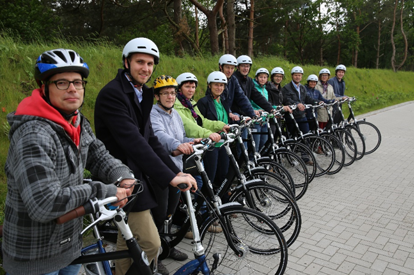A smart transport policy could turn the tide

More and more companies are experiencing the near-daily nuisance of traffic jams on our Flemish roads. Employees can no longer guarantee getting to their offices or customers in time, orders arrive late, staff absenteeism rises, etc. This is not entirely unsurprising, since over 70% of employees commute by car. As a company, you have two options: stand by passively or investigate the options for an innovative new work transport policy.
In 2015, we spent around 1,200 hours in traffic jams, which is equal to fifty whole days. The average cost of a car per hour is 10.58 euros. For companies in Flemish Brabant, Antwerp and Brussels congestion has serious economic consequences. In Flemish Brabant and Antwerp, 40% of small businesses experience disruption due to the congested roads, whilst in Brussels this figure is as high as 60%. This ultimately results in higher fuel costs, lost time due to traffic jams, rising stress and dissatisfaction.
Changing commuter attitudes to traffic
There is a growing realization that initiatives such as a transport budget, flexi-working, carpooling, cycling, shared vehicles and parking control have to be part of transport policy changes.
At the same time, a lot of companies want to know: what are the alternatives? How can we motivate our staff? What workload and costs does this bring?
Integrated transport
New transport policies cannot be instantly implemented and integrated. Broad public support, backed not only by management but also by employees, is crucial if it is to stand a chance of succeess. It must, as it were, be integrated within the vision of the company and become part of its DNA.
A clear strategy will help map where the company is today, where it wants to go and, crucially, how and when these goals can be achieved.
Investing in sustainable transport systems contributes to a positive image. This not only benefits current employees, but also makes the company more attractive to future employees.
A number of external factors play a part as well: public transport availability, the environment, cycle path networks, etc.
Expertise Center Smart Mobility is here to help
Companies that want to optimize their policy can now go to our Expertise Center Smart Mobility for individual consultancy. They currently have a Lean & Green Personal Mobility project, which is intended to reduce the commuting-related emissions of participating companies by 20% within 5 years.
Katrien Backx, project manager says, “For new clients, a practical action plan is created in consultation with the company. Through evaluation and monitoring, we follow their developments and offer guidance when necessary. After that, we introduce companies to a series of tools to help them implement and manage their new transport policy. To motivate employees, stars and awards can be earned. And of course, the sharing of their experience by the various participants creates added value."
Cycle to work schemes
For companies that want to start small, bringing in company bicycles appears to be a popular choice.
There are more and more tools supporting this initiative too, for example, the bikeform.be website. The site has a simulation tool which employers can use to calculate how much they save by investing in a bicycle policy.
Furthermore, they can go there to find financial advice and to look for decent suppliers.
75% from cars to bicycles
A nice example that illustrates the success of company bicycle schemes is our project Elmo@work. In this project, 70 employees from 7 different organizations swapped their existing mode of transport for one year for an electrical bicycle.
After this year, it turned out that during the test period, 75% of all commuter journeys previously undertaken by car were now done on the bicycle. This not only saved 15 tons of CO2 emissions, but also resulted in participants saving a total of €26,600, on both fuel savings and also the bonus received from their employer for taking the bicycle. This means that each participant separately saved 380 euros.
Flex-working on the rise
Another increasingly popular alternative is teleworking. At least 30% of Flemish organizations offer their employees the opportunity to work at a different location on a regular basis. In small companies, this number increases to 60%.
The market of coworking and business centers is on the rise as well. A number of successful initiatives have been seen in Brussels, Antwerp and Ghent in particular.
Commuting time becomes work time
Another innovation which we will very soon see on the Flemish roads is the office bus. This is a bus with all the mod cons of a small office on board, which takes employees to and from work.
Since users’ working hours start from the moment they board the bus, this turns the time on the bus into work time.
Particularly for employees from companies in remote locations, the office bus can save staff a lot of time.
Transport as a service
It is self-evident that all these shifts in our commuting behavior will have consequences for company transport policies. There is an increasing realization that transport is becoming a more personal issue.
Transport is transformed into a service where the complete offer of using a car, public transport, shared vehicles, etc. will be combined in 1 subscription.
Companies that want to keep up need to heed these latest developments.



